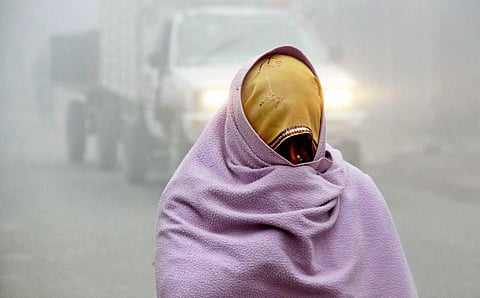

CHANDIGARHl : Despite global warming, there has been a staggering 506% increase in the number of cold waves in India, which are becoming longer and more intense, according to a study conducted by the Indian Institute of Science Education and Research (IISER). These cold waves are caused by stagnant weather systems known as atmospheric blocking conditions.
This increase in cold waves has led to a higher death toll in India compared to heat waves. The study reveals that north India is currently experiencing severe cold wave conditions, posing a greater risk of hypothermia and frostbite, especially for vulnerable groups such as children and the elderly. The study, titled “Synoptic dynamics of cold waves over north India: Underlying mechanisms of distinct cold wave conditions,” was conducted in collaboration with the National Institute for Space Research in Brazil.
Dr Raju Attada, a professor and the principal investigator of the weather and climate modeling lab at IISER Mohali, explained, “In India, cold waves have emerged as one of the deadliest extreme weather phenomena during the winter season. Our study identified a total of 509 cold wave days, including 45 days of severe cold wave conditions from 1982 to 2020. Notably, between 2010 and 2018, there was a shocking 506% increase in the number of cold waves in India, despite global warming.”
Attada further elaborated on the causes of these prolonged and intensified cold wave conditions, saying, “Some cold wave conditions, such as the current winter, persist longer due to atmospheric blocking conditions. These atmospheric blocks allow extremely cold air from northern latitudes to invade north India, exacerbating cold waves. Additionally, upper air weather systems over North India contribute to the subsidence of cold air, further intensifying cold waves and cold day conditions.”
The study underscores the severe consequences of cold waves on both human and animal populations. The risk of hypothermia and frostbite escalates during these extreme weather events, with significant impacts on human health, energy consumption, agriculture, and transportation in northern India. Attada said, “In 2003, a cold wave lasting 18 days in Bihar, Jharkhand, West Bengal, UP, parts of MP, and Uttarakhand resulted in the deaths of 1003 people.
Cold wave impact
The study underscores the severe consequences of cold waves on both human and animal populations. The risk of hypothermia and frostbite escalates during these extreme weather events, with significant impacts on human health, energy consumption, agriculture, and transportation in northern India. The study identified a total of 509 cold wave days, including 45 days of severe cold wave conditions from 1982 to 2020